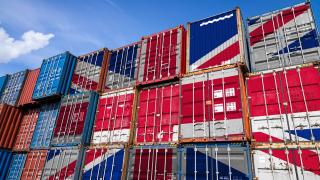
Reshoring has become an intrinsic part of the UK's subcontract engineering landscape this year, with more manufacturers than ever now recognising the value of having a national supply chain in place. While this trend has been growing in popularity during recent years, reshoring has been rapidly accelerated as a result of Brexit and the COVID-19 pandemic, with lengthy lead times and import fees now beginning to offset the cost benefit of overseas manufacturing.
There is much debate about the potential longevity of the current reshoring trend and the implications for the UK manufacturing industry as a result. Are national supply chains here to stay, or are they simply a short-term solution to a litany of coinciding sourcing issues?
The Case For Reshoring:
Are national supply chains here to stay, or are they simply a short-term solution to a litany of coinciding sourcing issues?
UK subcontract suppliers have long been credited with providing short lead times and outstanding levels of quality, yet for years this was not enough to lure UK buyers away from the cheaper cost per part facilitated by outsourcing overseas. This tunnel vision meant that the bigger picture was often overlooked; however, with recent events transpiring, the focus has broadened to include additional benefits.
Furthermore, the necessity for a national supply chain has increased due to a number of factors. Post-Brexit, import levies have driven up the cost of overseas manufacture considerably, meaning that buyers have been left paying more for parts that take months to arrive and may not be up to scratch from a quality perspective. Logistical difficulties during the COVID-19 pandemic also saw UK subcontract solutions soar in popularity, whilst the worldwide materials shortage has made the resulting lead times almost impossible to work with.
Reshoring has become a necessity amongst many purchasers, but there is speculation that the UK could revert back to old habits.
All of these factors have made reshoring a necessity amongst many purchasers, but as these factors either ease or become better-trodden ground, there is speculation that the UK could revert back to old habits. The question of whether reshoring is merely a means to an end comes down to its impact on the industry and whether or not it can accommodate the influx of work. In addition, there are further factors at play that could influence the direction that the industry takes moving forward.
READ: How Will Brexit Affect UK Subcontract Sourcing?
Climate and Cost Challenges:
As well as the import fees that have driven up the cost of overseas manufacturing since the UK left the EU, the climate crisis could also make the utilisation of international supply chains more difficult moving forward. The introduction of carbon taxes is not a case of if, but when, which means that UK buyers can expect to pay even more if they choose to stick with their overseas suppliers. Chances are that this will stoke the reshoring fires further still, but then the question arises of whether the UK engineering industry's infrastructure will be able to cope with the unprecedented rise in demand.
There could well come a time when UK suppliers simply do not have the capacity to cope with demand.
Although the materials shortage has compounded the difficulties in finding suppliers, there could well come a time when UK suppliers simply do not have the capacity to cope with demand. Manufacturing buyers may find themselves in something of a precarious situation if they do not make contingencies - and fast.
The rise in automation may go some way towards ensuring production levels can meet the levels required.
The rise in automation may go some way towards ensuring production levels can meet the levels required, but it would require some considerable investment in order to make it failsafe. The UK skills shortage has already reached critical levels, meaning that automation has the potential to step in and bridge the gap where humans currently cannot. However, although elements of automation and Industry 4.0 are widespread, they are far from being the norm - especially amongst SMEs, who may not be able to afford the upfront cost of investing in such technologies.
Of course, the establishment of a national supply chain is not an overnight process for companies who have traditionally gone overseas for their subcontract requirements. This means that there will be a slight pause for the UK engineering industry to get up to speed if this trend continues in line with the inevitable introduction of carbon taxes.
READ: What Does the Surge in Reshoring Mean For UK Subcontract Engineers & Manufacturers?
What Can We Expect Moving Forward?
While we can predict with some confidence that reshoring is here to stay, it is impossible to say with any certainty what the coming months and years will bring. Given the unprecedented events that have taken place in recent times, it would be foolish to think that we can accurately forecast what the future holds. However, with that being said, the issue of sustainability and carbon footprints does have the potential to ramp up reshoring even further and it is crucial that the industry is ready to meet such a challenge head-on.
Ultimately, the fate of reshoring rests in the hands of the UK engineering industry itself.
Ultimately, the fate of reshoring rests in the hands of the UK engineering industry itself - as well as the government. Even if reshoring is only on course to serve as a stop-gap, this period of time presents an astounding opportunity to capitalise on the trend and draw as many buyers back to national supply chains as possible. Our response to the current state of affairs will either catapult reshoring into being the norm, or stop it in its tracks.
Whilst UK engineering suppliers are fighting to deliver the best service possible amidst a rapidly-changing business landscape, the criticality of resolving national supply chain issues has never been more so than right now. Recent events have exposed the chinks in our armour, and issues such as materials and skills shortages, as well as a lack of investment, are unlikely to go away without intervention. After all, the industry has a lot to gain from their successful resolution and we need to do all we can to grasp this opportunity with both hands.
REPORT: How Widespread Is Home Working Within Engineering & Manufacturing?
